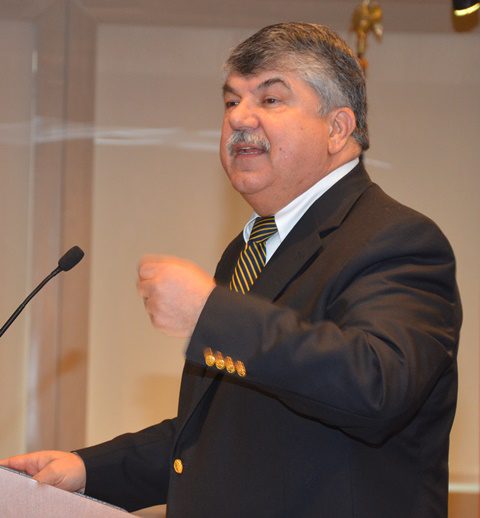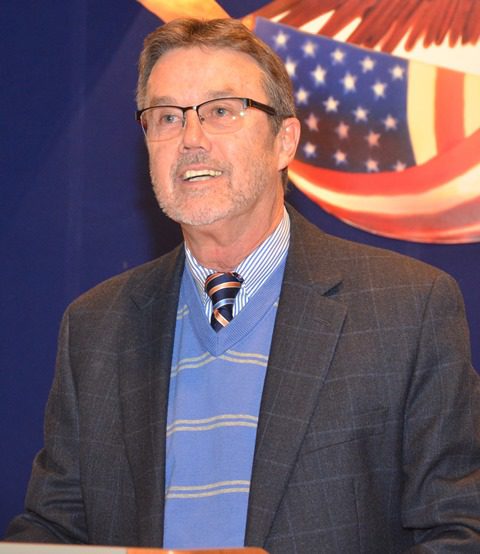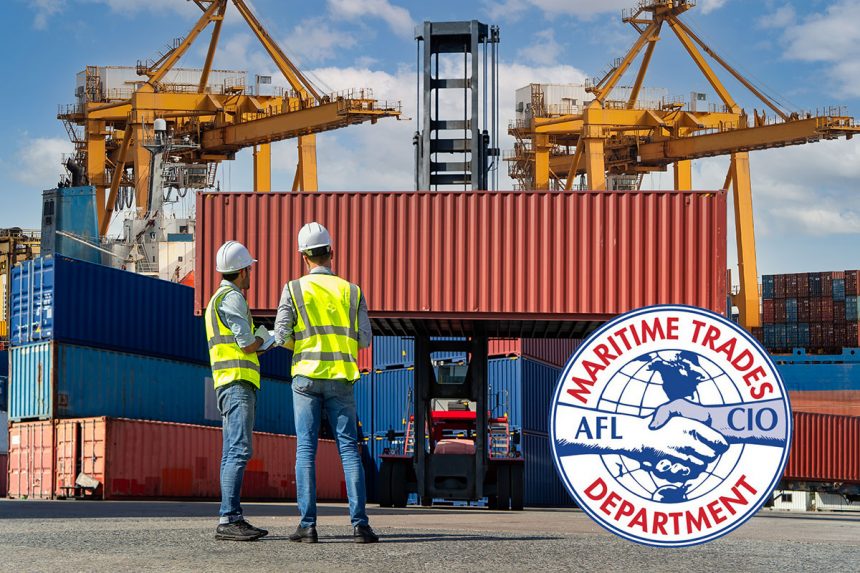
Two labor leaders told the MTD Executive Board that the fight for workers continues hard and strong not just in the South, but all over the country.
AFL-CIO President Richard Trumka and Georgia AFL-CIO President Charlie Flemming addressed the body on separate days during the two-day meeting in Atlanta: Trumka on February 20 and Flemming on the 19th.
Trumka told the audience he has a basic approach to one of America’s toughest challenges.
“The cure for what ails America right now is raising wages, and everything that we do, in one way or another, comes back to that very thing. If something raises wages, I’m for it. If something lowers wages, I’m against it,” said Trumka.
In addition, the federation’s pro-worker efforts definitely aren’t confined to union members.
“We’re fighting to raise wages for every worker out there,” he said, “and that fight takes many forms. It extends from our efforts to raise the minimum wage, to enact paid sick leave, to support investment for America’s seaports and locks and docks and railways, to our opposition to bad trade deals and anti-Jones Act proposals that would endanger our country’s waterways and further undercut the American middle class. The working class. Our class.”
Later, he explained the dangers of a presidential power known as trade promotion authority – more commonly called “fast track” – the use of which was authorized by Congress for such trade deals as NAFTA and CAFTA among others, and is currently being sought by President Barack Obama for talks with Asia and Europe.
“Here’s how fast track works,” Trumka said. “The president’s trade representative goes off in a dark room somewhere with people, comes back with an agreement, lays it down in front of Congress, and they have to vote it up or down. They can’t filibuster it, they can’t do anything but vote it up or down.”
Without the chance to introduce amendments or take the time to review the agreement in detail, any number of bad bills could be passed simply because there wasn’t adequate time for a detailed review, Trumka said.
He then broke down a complicated economic theory into easy-to-understand language.
“Raising wages spurs consumer spending, and remember, our economy is 72 percent driven by consumer spending,” the head of the AFL-CIO noted. “And that spending increases demand. And whenever we have a demand increase, companies have to hire people to meet that demand. That’s how raising wages creates a virtuous cycle of economic growth and shared prosperity.”
Those simple principles are reflected in the AFL-CIO’s “Common Sense Economics” program, a curriculum designed for working families to better understand that the state of the economy is not inevitable, but dictated by public policy. Spreading the Common Sense Economics message is important because, according to Trumka, too many people believe that the economy is fated and immutable.
“The economy is not like the weather,” he said. “The economy is nothing but a set of rules, and those rules decide the winners and they decide the losers. And those rules are made by the men and the women who we elect and put in office. And those rules have been rigged against us for far too long.”
He also talked about the AFL-CIO’s “Raising Wages” campaign, which kicked off on January 7 with the National Summit on Raising Wages held in the nation’s capital. This campaign is poised to spread the message across the country, with similar summits scheduled later this year in major cities including Atlanta, Philadelphia, St. Louis, San Diego, Minneapolis and Columbus, Ohio, as well as the early presidential primary/caucus states of Iowa, New Hampshire, Nevada and South Carolina.
In conclusion, Trumka urged the crowd to continue the multi-faceted efforts aimed at boosting the quality of life for America’s working families.
“When [opponents] tell you that we can’t raise wages, you tell them that we can, and we will,” the federation president declared. “When they tell you that we can’t have good pensions and good health care and good jobs, you tell them that we can, and we will. When they tell you that we can’t have better Social Security or Medicare, you tell them that we can, and we will. When they tell you that we can’t have better ports and harbors, and better roads and bridges, and a better rail system and electrical system, you tell them that we can, and we will. When they tell you that we can’t have stronger unions and more collective bargaining, you tell them that we can, and we will. When they tell you that our best years are somehow behind us, you tell them that our best years are still in front of us, for us and for our kids and for all the workers, and if they can’t deliver that to us, get the hell out of the way. Because we’re coming through, and we won’t stop standing together, fighting together, voting together and winning together.”
Flemming, a longstanding member of the MTD-affiliated International Association of Machinists (IAM), said Atlanta and its surrounding counties are experiencing a surge of new unionizing drives and employment opportunities for union members, thanks in part to the state labor federation’s efforts. He also offered a candid look at some of the challenges facing Georgia’s labor movement.
After pointing out that Georgia is controlled by anti-labor politicians, he stressed the importance of ensuring that union members vote, noting that the some of the final tallies in Georgia on Election Day 2014 were separated by less than 200,000 votes. He also mentioned that there are 100,000 union members and family members across the state who are not registered to vote, which could have turned the tide in some of those close races.
Flemming stated, “We have a lot of work to do, but it’s possible to turn Georgia, and I honestly believe in 2016 that there’s a real chance that a Democrat could win those races, or at least someone who supports workers.”
The Georgia AFL-CIO recently proved that outreach and spreading the message can have great effect on a community. In order to encourage voters to pass a referendum that would extend public transportation lines to the Atlanta-neighboring county of Clayton, one of the most economically depressed counties in the region, the state federation teamed up with 24 environmental, religious, labor, and civil rights groups and started a grassroots campaign.
Flemming reported that the results of their outreach were impressive, as 74 percent of voters approved the ballot initiative on November 4, with more citizens voting in favor of that transportation tax than for the governor or lieutenant governor. At a cost of a one-cent sales tax, the people of Clayton County voted to give themselves a chance to get better jobs in more affluent parts of the metropolitan area, thanks in part to the Georgia AFL-CIO canvassing the county and increasing awareness of the approaching vote, Flemming said.
Meanwhile, as a 37-year veteran of the airline industry, Flemming said he is passionate about helping the flight attendants of Delta Airlines – all 20,000 of them – secure union representation through the IAM. He also noted that nearly 12,000 of those flight attendants are based in Atlanta, and pledged that the Georgia AFL-CIO would do everything in its power to help those workers join a union.
Despite the tough political climate in his state, he talked about the recent increase in union contracts and projects underway in Georgia.
“We have two new stadiums being built here in Atlanta – a football stadium and a baseball stadium,” he said. “We’re not getting all the work, but we are getting about 60 percent of it. We’re deepening the ports down in Savannah, so there are good opportunities for growth down there, with our brothers and sisters who are longshoremen, as well as some of the truckers.”
He also talked about the union jobs in one of Georgia’s fastest growing industries, the film production industry. Atlanta has recently become the third largest production location in the country, with plenty of union job opportunities involved.
He concluded, “So, there are a lot of good things going on, and I think our future is bright. We just have to continue to plow the fields. There’s a lot of opportunity.”


